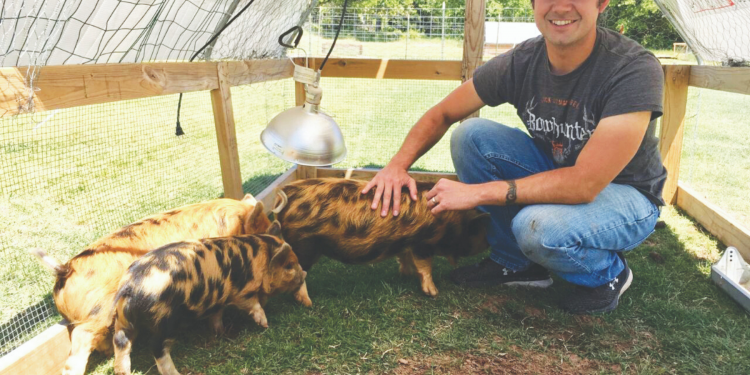CEMENT – Tucked gently into the rolling hills just north of Cement sits a budding farm focused on raising food production animals in a more “natural” way.
For Ray Pierce, owner of Pierce Farms, LLC, what once began as a simple backyard hobby that “started on a whim” has since led him into the business of selling local pasture-raised meat. After graduating from Cyril in 2011, Ray moved on to study business management at the University of Science and Arts of Oklahoma, before settling outside of Cement and starting a family.
When his original career plan shifted, Ray said he decided to delve into research about the commercial food production industry. It was then that he noticed a trend in the way consumers have become curious, inquiring more about their food sources and demanding healthier options. This awareness, or “movement” as Ray refers to it, caused him to take an even closer look at his own flock of free-range backyard chickens that he had at the time.
According to Ray, the small flock of layers he had acquired in a trade years prior were producing so many eggs that many had to be given away. But eventually, people took notice and had begun asking to purchase them. Wanting to offer consumers healthier, more natural meat sources, Ray began to experiment with the way he managed his chickens, hoping that success would secure a future for his family farm and possibly expand it even further.
“If we can just get people to understand it’s not just that they taste better, it’s that they’re better for you,” said Ray. “The biggest hurdle is getting the consumer to understand labels. Most labels in supermarkets are lies or at least half-truths.” In the commercial egg industry, Ray explained, producers can label eggs as “free range” if they have a stationary coop and allow the laying chickens access to an outside yard. What consumers don’t realize, he said, is that they’re still being fed the same commercial diets and are only allowed limited access to the natural world. Plus, once eggs are collected, they’re usually stored before they can be shipped to consumers, creating an “older”, less fresh tasting egg.
By using a regular pasture rotation schedule, Ray says his current flock of 90 plus layers have full access to the Oklahoma land and all the nutrients it provides. This allows his birds to produce a more natural, healthier and overall, tastier egg. “It’s just all about the health benefits in my opinion,” Ray said. “They have higher Omega 3’s, lower saturated fats and they’re local.” “You’ll see a more rich, golden yellow color to the yolk. The yolk actually has more lift where it sits up in the white. I just love raising good food like that.”
As a kid, Ray said he used to be allergic to eggs and never cared much for the taste of them. Now, he says he can eat his pastured-raised eggs without any problems. “There’s so much more taste to them,” he said. “With these eggs I can boil them, crack them and eat them straight from the shell. They don’t’ need anything added to them.” Gathering up an average of about 80 fresh eggs daily from a mixed flock of Red Star and Americana layers, Pierce
Farms sells to the public. A large dozen will cost consumers $4.00 for farm pick up and an additional $0.50 if local delivery is needed. With the layers producing so well and egg sales underway, Pierce Farms will soon be taking pre-orders on their growing flock of pasture-raised meat chickens. Letting the birds forage off the land prior to butchering provides a “more moist and flavorful meat” compare to commercially purchased options, said Ray. Working toward expanding the business beyond just poultry, several Kune Kune piglets have also been
added to the farm this spring. Viewing it as an experiment, Ray said the specific breed was selected due to their unique foraging capabilities. As they grow, the hope is that one day they can sustain themselves off the land without the need for additional feed in their diet, said Ray. If the Kune Kune experiment goes as well as planned, Pierce Farms may one day offer pasture-raised pork for purchase, giving consumers yet another option for a more natural, local food source.
Want to reach a local audience and grow your business?
Our website is the perfect platform to connect with engaged readers in your local area.
Whether you're looking for banner ads, sponsored content, or custom promotions, we can tailor a package to meet your needs.
Contact us today to learn more about advertising opportunities!
CONTACT US NOW



